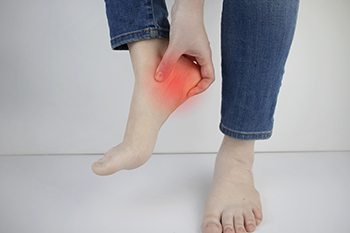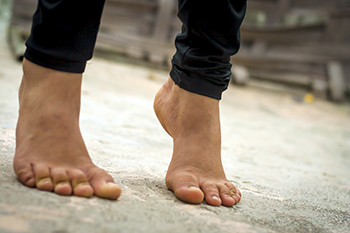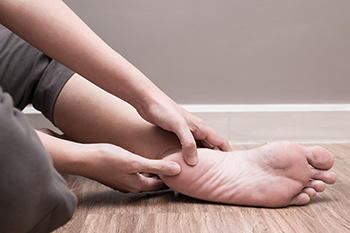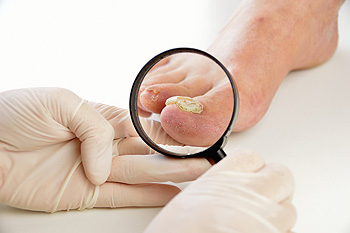
Obesity affects every part of your body - including your feet and ankles. People over 60 who are obese have been found to experience more foot pain, have reduced toe and ankle strength, and have a slower walking speed, among other problems. Excess body weight strains the lower limbs, leading to functional and structural changes that can impact your mobility and quality of life. This is particularly the case for older adults. One of the best ways to maintain the health of your feet and improve your overall health is to eat a healthy diet, exercise, and lose weight. Unfortunately, this can be very difficult if you have foot and ankle pain that makes it harder to exercise or even stand for long periods of time. A podiatrist can help you reduce foot and ankle pain and increase your mobility so that you can improve your quality of life. For more information, please consult with a podiatrist.
Obesity has become very problematic at this point in time and can have extremely negative effects on the feet. If you’re an obese individual and are concerned about your feet, contact the podiatrists from The Foot & Ankle Center of New Jersey. Our doctors can provide the care you need to keep you pain-free and on your feet.
Obesity and Your Feet
Since your feet are what support your entire weight when standing, any additional weight can result in pain and swelling. Being overweight is one of the main contributors to foot complications.
Problems & Complications
Extra Weight – Even putting on just a few extra pounds could create serious complications for your feet. As your weight increases, your balance and body will shift, creating new stresses on your feet. This uneven weight distribution can cause pain, even while doing the simplest tasks, such as walking.
Diabetes – People who are overweight are at serious risk of developing type-2 diabetes, which has a drastic impact on the health of your feet. As you get older, your diabetes might worsen, which could lead to loss of feeling in your feet, sores, and bruises. You could also become more prone to various infections.
Plantar fasciitis – Pressure and stress that is placed on muscles, joints, and tendons can trigger plantar fasciitis, which is an inflammation of tissue that forms along the bottom of the foot.
If you have any questions please feel free to contact our office located in Paramus, NJ . We offer the newest diagnostic and treatment technologies for all your foot and ankle needs.
Beating a fungal toenail infection on your own can be a daunting task. The pesky fungus responsible for the infection is hearty, spreads easily to other nails, and won’t go down without a long fight. Making matters worse, even after the fungus is killed, it takes a long time for a healthy nail to grow in. Luckily, podiatrists have plenty of experience and various methods for treating this very common condition. For instance, there are topical and oral prescriptions as well as antifungal medications that are stronger and can be more effective than those sold over the counter. FDA-approved laser treatments—which kill the fungus using a precision beam of light—have become an increasingly popular treatment for toenail infections. Additionally, there are exciting cosmetic procedures available which create a natural-looking nail on top, giving the real nail time to grow back. To join forces and get professional help in defeating your fungal toenail infection, call a podiatrist near you.
For more information about treatment, contact the podiatrists of The Foot & Ankle Center of New Jersey. Our doctors can provide the care you need to keep you pain-free and on your feet.
Toenail Fungus Treatment
Toenail fungus is a condition that affects many people and can be especially hard to get rid of. Fortunately, there are several methods to go about treating and avoiding it.
Antifungals & Deterrence
Oral antifungal medicine has been shown to be effective in many cases. It is important to consult with a podiatrist to determine the proper regiment for you, or potentially explore other options.
Applying foot powder on the feet and shoes helps keep the feet free of moisture and sweat.
Sandals or open toed shoes – Wearing these will allow air movement and help keep feet dry. They also expose your feet to light, which fungus cannot tolerate. Socks with moisture wicking material also help as well.
If you have any questions please feel free to contact our office located in Paramus, NJ . We offer the newest diagnostic tools and technology to treat your foot and ankle needs.
If you have rheumatoid arthritis, you may be experiencing joint pain and stiffness in your feet. Gentle exercises can help reduce foot pain for people dealing with this condition. One simple exercise that you can try is rolling a stress ball with your foot so that the ball is underneath the front part of your heel. This helps stretch the plantar fascia, a ligament that runs along the bottom of your foot and supports your arches. You can do this exercise while sitting or standing. To learn more about how to take care of your feet with a diagnosis of rheumatoid arthritis, and to learn more about helpful exercises you can practice, please consult with a podiatrist.
Because RA affects more than just your joints, including the joints in your feet and ankles, it is important to seek early diagnosis from your podiatrist if you feel like the pain in your feet might be caused by RA. For more information, contact the podiatrists of The Foot & Ankle Center of New Jersey. Our doctors will assist you with all of your podiatric concerns.
What Is Rheumatoid Arthritis?
Rheumatoid Arthritis (RA) is an autoimmune disorder in which the body’s own immune system attacks the membranes surrounding the joints. Inflammation of the lining and eventually the destruction of the joint’s cartilage and bone occur, causing severe pain and immobility.
Rheumatoid Arthritis of the Feet
Although RA usually attacks multiple bones and joints throughout the entire body, almost 90 percent of cases result in pain in the foot or ankle area.
Symptoms
Diagnosis
Quick diagnosis of RA in the feet is important so that the podiatrist can treat the area effectively. Your doctor will ask you about your medical history, occupation, and lifestyle to determine the origin of the condition. Rheumatoid Factor tests help to determine if someone is affected by the disease.
If you have any questions please feel free to contact our office located in Paramus, NJ . We offer the newest diagnostic and treatment technologies for all your foot and ankle needs.
 Plantar fasciitis is one of the most common causes of pain in the heel. This condition can occur when the plantar fascia, which is a band of tissue that runs from the bottom of the heel to the front of the foot, becomes inflamed or torn. Generally, plantar fasciitis is considered to be an overuse injury. There are other issues such as foot biomechanics, ill-fitted footwear, being overweight, or having tight calf muscles that can lead to an increased risk of plantar fasciitis as well. Plantar fasciitis usually results in heel pain that gradually worsens over time, tenderness when pressing onto the heel, and heel pain that is worse in the morning. Patients who notice any of the symptoms of heel pain or plantar fasciitis should consult with a podiatrist for a proper diagnosis and treatment for their condition.
Plantar fasciitis is one of the most common causes of pain in the heel. This condition can occur when the plantar fascia, which is a band of tissue that runs from the bottom of the heel to the front of the foot, becomes inflamed or torn. Generally, plantar fasciitis is considered to be an overuse injury. There are other issues such as foot biomechanics, ill-fitted footwear, being overweight, or having tight calf muscles that can lead to an increased risk of plantar fasciitis as well. Plantar fasciitis usually results in heel pain that gradually worsens over time, tenderness when pressing onto the heel, and heel pain that is worse in the morning. Patients who notice any of the symptoms of heel pain or plantar fasciitis should consult with a podiatrist for a proper diagnosis and treatment for their condition.
Plantar fasciitis is a common foot condition that is often caused by a strain injury. If you are experiencing heel pain or symptoms of plantar fasciitis, contact the podiatrists from The Foot & Ankle Center of New Jersey. Our doctors can provide the care you need to keep you pain-free and on your feet.
What Is Plantar Fasciitis?
Plantar fasciitis is one of the most common causes of heel pain. The plantar fascia is a ligament that connects your heel to the front of your foot. When this ligament becomes inflamed, plantar fasciitis is the result. If you have plantar fasciitis you will have a stabbing pain that usually occurs with your first steps in the morning. As the day progresses and you walk around more, this pain will start to disappear, but it will return after long periods of standing or sitting.
What Causes Plantar Fasciitis?
There are some risk factors that may make you more likely to develop plantar fasciitis compared to others. The condition most commonly affects adults between the ages of 40 and 60. It also tends to affect people who are obese because the extra pounds result in extra stress being placed on the plantar fascia.
Prevention
There are a variety of treatment options available for plantar fasciitis along with the pain that accompanies it. Additionally, physical therapy is a very important component in the treatment process. It is important that you meet with your podiatrist to determine which treatment option is best for you.
If you have any questions, please feel free to contact our office located in Paramus, NJ . We offer the newest diagnostic and treatment technologies for all your foot care needs.
 We all deal with foot sweat from time to time, but if you find that your feet are wet, clammy, or leaving soggy footprints on the floor, you may have plantar hyperhidrosis. Hyperhidrosis is a medical condition that causes excessive sweating. It can affect various parts of the body, but is particularly common in feet. Other than being annoying and possibly embarrassing, untreated plantar hyperhidrosis can have health consequences. Excessive sweating can make the feet perpetually moist, increasing the risk of fungal (athlete’s foot, toenail fungus), bacterial (folliculitis), and viral (warts caused by HPV) infections and skin breakdown. A heat rash, which causes itching, redness, and stinging, may also develop. If you are suffering from plantar hyperhidrosis, a podiatrist can help find the most effective treatment for you.
We all deal with foot sweat from time to time, but if you find that your feet are wet, clammy, or leaving soggy footprints on the floor, you may have plantar hyperhidrosis. Hyperhidrosis is a medical condition that causes excessive sweating. It can affect various parts of the body, but is particularly common in feet. Other than being annoying and possibly embarrassing, untreated plantar hyperhidrosis can have health consequences. Excessive sweating can make the feet perpetually moist, increasing the risk of fungal (athlete’s foot, toenail fungus), bacterial (folliculitis), and viral (warts caused by HPV) infections and skin breakdown. A heat rash, which causes itching, redness, and stinging, may also develop. If you are suffering from plantar hyperhidrosis, a podiatrist can help find the most effective treatment for you.
If you are suffering from hyperhidrosis contact the podiatrists of The Foot & Ankle Center of New Jersey. Our doctors can provide the care you need to attend to all of your foot and ankle needs.
Hyperhidrosis of the Feet
Hyperhidrosis is a rare disorder that can cause people to have excessive sweating of their feet. This can usually occur all on its own without rigorous activity involved. People who suffer from hyperhidrosis may also experience sweaty palms.
Although it is said that sweating is a healthy process meant to cool down the body temperature and to maintain a proper internal temperature, hyperhidrosis may prove to be a huge hindrance on a person’s everyday life.
Plantar hyperhidrosis is considered to be the main form of hyperhidrosis. Secondary hyperhidrosis can refer to sweating that occurs in areas other than the feet or hands and armpits. Often this may be a sign of it being related to another medical condition such as menopause, hyperthyroidism and even Parkinson’s disease.
In order to alleviate this condition, it is important to see your doctor so that they may prescribe the necessary medications so that you can begin to live a normal life again. If this is left untreated, it is said that it will persist throughout an individual’s life.
A last resort approach would be surgery, but it is best to speak with your doctor to find out what may be the best treatment for you.
If you have any questions please feel free to contact our office located in Paramus, NJ . We offer the newest diagnostic and treatment technologies for all your foot and ankle needs.
Most runners are familiar with plantar fasciitis, a common overuse injury to the ligament that runs along the bottom of the foot. Plantar fasciitis can lead to heel and arch pain, and while it usually responds well to conservative treatments, it can also become a chronic condition. However, plantar fasciitis is not the sole cause of foot pain among runners. Sometimes foot pain can be due to problems further up in the calf muscles and Achilles tendons. Pain from injuries to these areas often radiate down to the foot. If you are experiencing foot pain, a podiatrist is best equipped to diagnose the cause and find the appropriate treatments for you.
Foot Pain
Foot pain can be extremely painful and debilitating. If you have a foot pain, consult with the podiatrists from The Foot & Ankle Center of New Jersey. Our doctors will assess your condition and provide you with quality foot and ankle treatment.
Causes
Foot pain is a very broad condition that could be caused by one or more ailments. The most common include:
Diagnosis
To figure out the cause of foot pain, podiatrists utilize several different methods. This can range from simple visual inspections and sensation tests to X-rays and MRI scans. Prior medical history, family medical history, and any recent physical traumatic events will all be taken into consideration for a proper diagnosis.
Treatment
Treatment depends upon the cause of the foot pain. Whether it is resting, staying off the foot, or having surgery; podiatrists have a number of treatment options available for foot pain.
If you have any questions, please feel free to contact our office located in Paramus, NJ . We offer the newest diagnostic and treatment technologies for all your foot care needs.
 The feet are considered to be the foundation of the body, and heel pain for any reason may hinder accomplishing daily activities. The structure of the foot is designed to protect the foot from potential impact, and it is beneficial to know the reason why existing heel pain occurs. There are several foot conditions that can affect the heel, such as plantar fasciitis, Achilles tendon injuries, and bursitis of the foot. The bottom of the foot is where the plantar fascia is found, and it can cause severe pain and discomfort if it should become inflamed. There are specific stretches that can be performed which may help to diminish the pain from plantar fasciitis. Achilles tendon injuries and bursitis may be improved when under the care of a podiatrist, and it is suggested that a consultation be scheduled.
The feet are considered to be the foundation of the body, and heel pain for any reason may hinder accomplishing daily activities. The structure of the foot is designed to protect the foot from potential impact, and it is beneficial to know the reason why existing heel pain occurs. There are several foot conditions that can affect the heel, such as plantar fasciitis, Achilles tendon injuries, and bursitis of the foot. The bottom of the foot is where the plantar fascia is found, and it can cause severe pain and discomfort if it should become inflamed. There are specific stretches that can be performed which may help to diminish the pain from plantar fasciitis. Achilles tendon injuries and bursitis may be improved when under the care of a podiatrist, and it is suggested that a consultation be scheduled.
Many people suffer from bouts of heel pain. For more information, contact the podiatrists of The Foot & Ankle Center of New Jersey. Our doctors can provide the care you need to keep you pain-free and on your feet.
Causes of Heel Pain
Heel pain is often associated with plantar fasciitis. The plantar fascia is a band of tissues that extends along the bottom of the foot. A rip or tear in this ligament can cause inflammation of the tissue.
Achilles tendonitis is another cause of heel pain. Inflammation of the Achilles tendon will cause pain from fractures and muscle tearing. Lack of flexibility is also another symptom.
Heel spurs are another cause of pain. When the tissues of the plantar fascia undergo a great deal of stress, it can lead to ligament separation from the heel bone, causing heel spurs.
Why Might Heel Pain Occur?
Treatments
Heel pain should be treated as soon as possible for immediate results. Keeping your feet in a stress-free environment will help. If you suffer from Achilles tendonitis or plantar fasciitis, applying ice will reduce the swelling. Stretching before an exercise like running will help the muscles. Using all these tips will help make heel pain a condition of the past.
If you have any questions please contact our office located in Paramus, NJ . We offer the newest diagnostic and treatment technologies for all your foot and ankle needs.
 A small percentage of people worldwide develop toenail fungus. Research has indicated the amount of people who are afflicted with this type of fungus can increase as the aging process occurs. Common symptoms many people experience with toenail fungus can include yellowed and brittle nails, and in severe cases, the nail may turn black and fall off. This ailment is caused by a fungus that lives and thrives in warm and moist environments, and is considered to be contagious. These types of areas can include public swimming pools, locker rooms, and surrounding areas. Research has indicated the chances of developing toenail fungus may diminish when appropriate shoes are worn while in these types of environments. If you have symptoms of this type of fungal infection, it is strongly suggested that you consult with a podiatrist who can discuss what the best course of treatment is for you.
A small percentage of people worldwide develop toenail fungus. Research has indicated the amount of people who are afflicted with this type of fungus can increase as the aging process occurs. Common symptoms many people experience with toenail fungus can include yellowed and brittle nails, and in severe cases, the nail may turn black and fall off. This ailment is caused by a fungus that lives and thrives in warm and moist environments, and is considered to be contagious. These types of areas can include public swimming pools, locker rooms, and surrounding areas. Research has indicated the chances of developing toenail fungus may diminish when appropriate shoes are worn while in these types of environments. If you have symptoms of this type of fungal infection, it is strongly suggested that you consult with a podiatrist who can discuss what the best course of treatment is for you.
If left untreated, toenail fungus may spread to other toenails, skin, or even fingernails. If you suspect you have toenail fungus it is important to seek treatment right away. For more information about treatment, contact the podiatrists of The Foot & Ankle Center of New Jersey. Our doctors can provide the care you need to keep you pain-free and on your feet.
Symptoms
Treatment
If self-care strategies and over-the-counter medications does not help your fungus, your podiatrist may give you a prescription drug instead. Even if you find relief from your toenail fungus symptoms, you may experience a repeat infection in the future.
Prevention
In order to prevent getting toenail fungus in the future, you should always make sure to wash your feet with soap and water. After washing, it is important to dry your feet thoroughly especially in between the toes. When trimming your toenails, be sure to trim straight across instead of in a rounded shape. It is crucial not to cover up discolored nails with nail polish because that will prevent your nail from being able to “breathe”.
In some cases, surgical procedure may be needed to remove the toenail fungus. Consult with your podiatrist about the best treatment options for your case of toenail fungus.
If you have any questions, please feel free to contact our office located in Paramus, NJ . We offer the newest diagnostic and treatment technologies for all your foot care needs.